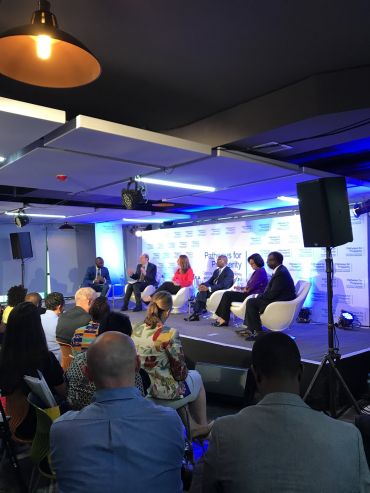
Image credit: Shutterstock
Global commission to examine how new technologies can benefit poorest
Oxford University's Blavatnik School of Government and the Bill & Melinda Gates Foundation have today launched the Pathways for Prosperity initiative to explore the impact of rapid technological change on developing countries.
The new commission, led by the Blavatnik School of Government, brings together a diverse range of leaders from government, business and academia to focus on the impact on developing countries of frontier technologies such as automation, artificial intelligence, 3D printing, energy generation and storage, and biotechnology. The commission will provide evidence and analysis, along with concrete policy recommendations, to help developing countries' governments navigate this rapidly evolving landscape.
Pathways for Prosperity: Commission on Technology and Inclusive Development was launched in Nairobi by Melinda Gates, co-chair of the Bill & Melinda Gates Foundation; Minister Sri Mulyani Indrawati, minister of finance in Indonesia; and Strive Masiyiwa, founder and executive chairman of the telecommunications company Econet.
The launch coincides with the World Economic Forum in Davos, Switzerland, where global leaders are gathered to discuss the importance of creating a 'shared future in a fractured world'. The commission emphasises the need for the global conversation to include the role of technology in driving progress and inclusion in developing countries.
 The Pathways for Prosperity launch in Nairobi.
The Pathways for Prosperity launch in Nairobi.'As an entrepreneur, technology underpins everything I do, and I am fascinated by what is coming down the line. But I know that there are also potential pitfalls and risks,' said Strive Masiyiwa. 'This commission gives us a way of working together to understand how to harness technology for good, use it to enhance opportunities for all and drive inclusive growth.'
The Blavatnik School's Stefan Dercon, former chief economist at the UK Department for International Development, and Benno Ndulu, former governor of the Central Bank of Tanzania, will lead the commission as its academic directors.
'Innovation can help people transform their lives, but only if they have access to it,' said Melinda Gates. 'This commission brings together diverse thinkers and doers committed to ensuring that everyone, no matter how rich or poor, can take advantage of technological innovation.'
While some technological advancements may disrupt or block traditional routes out of poverty by making certain jobs obsolete, some new technologies could offer an alternative roadmap to inclusive development. For instance, the widespread use of digital financial services in Kenya has enabled 75% of people over 15 years old to have access to bank accounts (up from 10% in 2005), and mobile financial services such as M-Pesa have lifted 2% of the population out of poverty.
Today's launch, a panel discussion moderated by Larry Madowo, a Kenyan journalist and news anchor, was the first of several events the commission will hold around the world over the next two years. Each meeting will focus on different thematic issues and countries, with the common aim of helping governments in developing countries take advantage of the opportunities technology brings.
'The world has made incredible progress over the past 25 years, with the number of people living in extreme poverty being halved to about 800 million,' said Stefan Dercon. 'Whether this positive trend continues depends in large part on how we respond to the new forces shaping our world, specifically rapid technological change.'
 British children are growing taller but not for the right reasons
British children are growing taller but not for the right reasons
 Expert Comment: The war in the Gulf
Expert Comment: The war in the Gulf
 International Advisory Board to strengthen global leadership in primary care
International Advisory Board to strengthen global leadership in primary care
 Expert Comment: Church-to-mosque conversions grab headlines, but is funding the real crisis?
Expert Comment: Church-to-mosque conversions grab headlines, but is funding the real crisis?